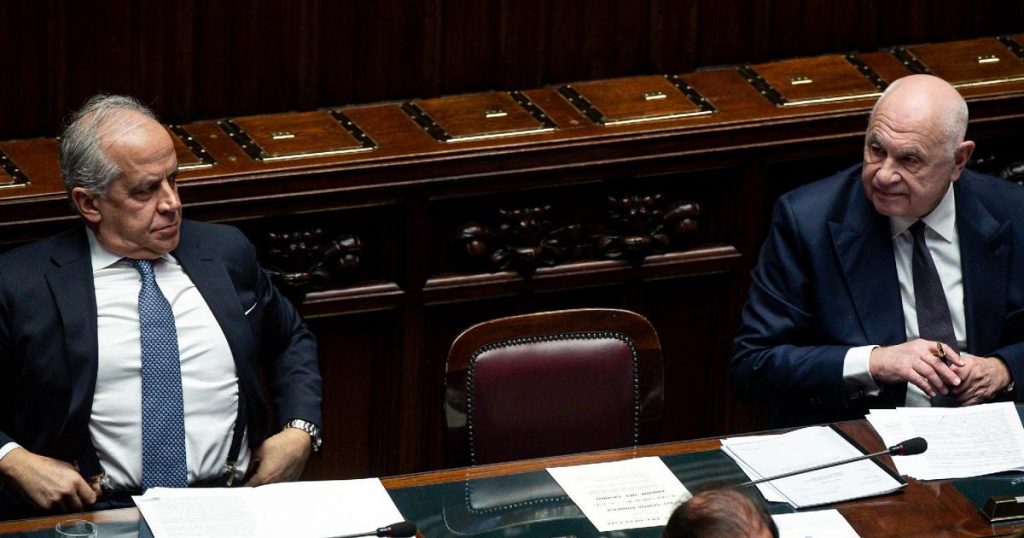High Tension in Parliament Over the Almasri Case
The Italian Parliament has been gripped by intense political drama and confrontation following the government’s decision to extradite Libyan commander Osama Njeem Almasri via a state flight. The tensions erupted first in the Chamber of Deputies and later in the Senate, with the Minister of Justice, Carlo Nordio, delivering a fiery speech that sparked heated exchanges with the opposition and judiciary. Nordio described the International Criminal Court’s (ICC) arrest warrant for Almasri as "radically null" and dismissed it as a "hasty mess." He accused the opposition and certain members of the judiciary of not fully understanding the case and instead focusing on invented or misleading news. Nordio’s words were met with outrage from opposition benches, including the Democratic Party (PD), the Five Star Movement (M5S), and Action (AVS), who criticized the government’s handling of the matter and its attacks on the judiciary.
Nordio aligned himself with Prime Minister Giorgia Meloni’s confrontational approach toward the judiciary, warning magistrates not to obstruct the government’s reforms. He claimed that the judiciary’s criticism had only strengthened the ruling majority, eliminating any hesitation about proceeding with controversial legal reforms. The Minister of Justice received a standing ovation from the center-right coalition, further deepening the divide within Parliament. Meanwhile, Prime Minister Meloni was notably absent from the proceedings, with only an empty chair representing her during the debate.
Opposition’s Furious Reaction and Accusations of Government Complicity
The opposition unleashed its fury over the government’s decision to deport Almasri, labeling it a shameful act that prioritized political convenience over justice and human rights. Matteo Renzi, leader of the Italia Viva (IV) party, delivered a scathing critique, comparing Meloni to "Pinocchio’s man of butter," who is strong against the weak but weak against the strong. Renzi accused Meloni of cowardice for not appearing in Parliament to explain her government’s actions, suggesting that the "national interest" was being misused to justify the deportation. He also implied that the real motivation behind the decision was to protect economic interests, specifically referencing the Italian energy giant Eni’s dealings in Libya.
In the Chamber of Deputies, members of the AVS party displayed harrowing images of tortured prisoners from Libyan jails, including those linked to Almasri, to highlight the consequences of the government’s actions. The protest culminated in a walkout, leaving the Chamber empty. The debate then shifted to the Senate, where tensions remained high. Matteo Salvini, the Deputy Prime Minister, was notably absent, further fueling accusations of government evasion and complicity.
Judge María del Socorro Flores Liera: The Government’s Key Argument
At the heart of the government’s defense is the opinion of Judge María del Socorro Flores Liera, a member of the ICC who dissented from the court’s decision to issue an arrest warrant for Almasri. Judge Flores Liera argued that the ICC lacked jurisdiction over the crimes allegedly committed by Almasri, claiming that the ongoing turmoil in Libya did not directly relate to the UN Security Council’s 2011 referral, which had initially activated the court’s involvement. Her dissenting opinion, attached to the ICC’s arrest warrant document, formed the basis of the government’s arguments in Parliament. Nordio repeatedly cited Flores Liera’s analysis to dismiss the ICC’s authority in the case, labeling the court’s actions as a "mess" and questioning its credibility.
Judge Flores Liera, a respected figure in international law with a long diplomatic and judicial career, has been a key voice in the government’s narrative. Her credentials as a former negotiator for the creation of the ICC and her extensive work on human rights and international crimes added weight to the government’s claims. However, critics argue that the government cherry-picked her dissent to justify its decision, ignoring the broader consensus within the ICC on Almasri’s case.
Broader Political and Judicial Fallout
The Almasri case has exposed deep divisions within the Italian political landscape and judiciary. In the Senate, the debate took a personal turn when League Senator Alberto Balboni attacked the Democratic Party over the arrest of its treasurer in an investigation linked to migration. Balboni alleged that the treasurer, a close associate of former PD leader Graziano Delrio, must have been aware of wrongdoing. The PD’s Elly Schlein rebuffed the accusations, pointing out that her party had promptly suspended the treasurer, unlike the League, which had failed to remove Minister Giancarlo Giorgetti despite his indictment in a corruption case.
The exchanges between the ruling coalition and the opposition turned increasingly hostile, with Renzi accusing the League of hypocrisy and referencing past scandals, such as the Bibbiano child abuse case and the Bank of Etruria collapse. Forza Italia Senator Maurizio Gasparri countered by raising concerns over the leaks of sensitive documents related to the Almasri case, implying that the opposition was misusing classified information for political gain. The session ended with no resolution, leaving the political and judicial conflict unresolved.
The Human Rights Dimension and the Way Forward
The Almasri case has also brought attention to the broader human rights implications of deporting individuals to Libya, where reports of torture, abuse, and extrajudicial killings are widespread. The AVS delegation’s display of images from Libyan prisons served as a stark reminder of the potential consequences of Italy’s decision. Critics argue that the government’s actions undermine Italy’s commitment to human rights and international justice, while supporters claim that the move was necessary for national security and stability in the region.
The debate has further polarized the political landscape, with the center-right coalition doubling down on its support for Meloni’s leadership and the opposition vowing to continue its resistance. As the diplomatic and legal fallout continues, the Almasri case has emerged as a defining issue for the current government, testing its resolve on issues ranging from judicial independence to human rights. The outcome of this political and judicial showdown will likely have far-reaching consequences for Italy’s role in international justice and its domestic policies on migration and security.












